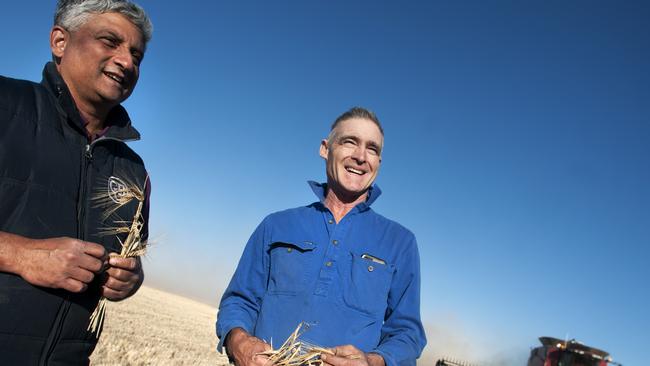Asahi seeks to buy barley directly from Australian farmers to combat China bans
Could a keg of VB help combat China’s bans on Australian barley?

The maker of Fosters and VB is brewing a plan to showcase Australian barley to more international markets after China slammed the door on Australian barley growers with punitive tariffs.
Carlton & United Breweries is now buying barley directly from farmers to supply its breweries at Abbotsford in Melbourne’s inner east and Laverton in the city’s west, as opposed to buying product from bulk handler GrainCorp.
The plan is more than seeking to capitalise on the growing trend of provenance and traceability across food and beverages.
Chief brewer Jaideep Chandrasekharan said buying directly from farmers was a chance to ensure a higher quality and consistent product as well as show off Australian grain to CUB’s Japanese parent Asahi, which bought the Melbourne-based brewer for $16bn earlier this year.
“Obviously there’s been the loss of the Chinese market with the tariffs. [But] we certainly see this problem as an opportunity for us to showcase Australian agriculture and Australian barley — not just within the Australian context but with our principals in Japan as well,” Mr Chandrasekharan said.
“Asahi source globally, so Australia is one of the markets where they source from, and we certainly see an opportunity to showcase that and potentially increase the amount of barley sourced from here.”
Japan is the seventh-biggest beer-drinking country in the world, accounting for 2.7 per cent of global consumption — just in front of the UK, which accounts for 2.5 per cent. Meanwhile, Australian farmers produce more than 1 million tonnes of malting barley each year for brewing in Australia and overseas.
Mr Chandrasekharan said farmers had valued Asahi buying barley directly from them, moving further up the value chain and being more involved in the beer brewing process.
“What we found is that by engaging directly with the farmer we can also provide them with information about the new varieties which are coming, which are the ones brewers prefer, whether it’s internally in Australia or externally in export markets, and giving that information to farmers.
“They value that kind of information because sometimes it’s quite hard for them to get that.”
In return, Mr Chandrasekharan said Asahi could deliver a more consistent product, knowing exactly what variety it was sourcing from a particular region.
“The difference between brewing and winemaking is that we both rely on agriculture inputs but brewers have to pretty much supply the same product year on year, even though you can have variability in terms of the input,” he said.
“Obviously under the old system, you didn’t really know where your barley came from. You essentially bought a variety and GrainCorp could effectively source that for you from anywhere. Whereas, what this does is give us line of sight to the farm.”
Asahi launched the program earlier this month during the barley harvest season across its CUB operations in Victoria. More than 30 farmers in the barley-growing regions of the Wimmera and Mallee have already been engaged, with their barley to be sent to Abbotsford for brewing once it has been malted.
The loss of Australia’s Chinese barley trade has hit barley growers hard, with many slashing the amount of plantings — in some cases by more than half.
China’s communist regime imposed punitive 80 per cent tariffs on Australian barley in May after it vented outrage over Scott Morrison pushing for an inquiry into the origins of COVID-19 and over Canberra’s foreign interference legislation.
In September, Beijing then banned imports from Australia’s biggest barley exporter, Perth-headquartered CBH, after also targeting other Australian products including wine, timber, lobster and earlier this month coal.
The barley bans and sanctions effectively cruelled Australia’s barley exports to China, which in the past five years has bought 60-70 per cent of Australian barley, with exports totalling $1.3bn. Japan is the second-biggest buyer of Australian barley, with exports totalling $217m, and has been buying up more Australian grain along with Vietnam and Saudi Arabia, the respective exports of which total $22m and $98m.
“I’m excited by the opportunity and the impact it will have on the economy,” said John Bennett, a barley grower in Victoria’s West Wimmera region.
Mr Bennett, who halved the amount of barley he planted this year following the Chinese bans and tariffs, added: “A fundamental benefit of the program for me … is CUB/Asahi making a commitment to support Australian farmers. That will have a direct benefit to our business and many others like ours.
“Australia is embedded in agriculture and I like to think its future is, too. I’m very keen for people to know we are world class at what we do.”
Asahi has received Australian regulatory approval to sell its beer and cider brands, including Strongbow, Little Green and Bonamy’s, Stella Artois and Beck’s, to Dutch brewing giant Heineken.




To join the conversation, please log in. Don't have an account? Register
Join the conversation, you are commenting as Logout